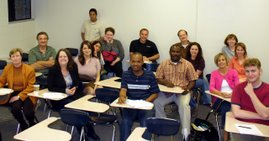Sunday, January 28, 2007
The power of literary text
“Far from being divorced from the world, literary production is itself a form of social practice: texts do not merely reflect social reality but create it,” wrote Lee Paterson in his article, Literary History. Paterson’s statement strikes the inner part of my heart. It helps me realizing the power and influence a literary work can have on a society and culture. Truly, an individual can use such kind of writing to create a world within and around him. For example, Patrick Modiano, in his novel, Dora Bruder, tells a story of a young woman’s experience of the atrocities of the Nazis against the Jews. Bruder serves as a bridge that enables readers to travel in the past. Through the text, they are able to connect with the Jews, the French, the social structure, the Nazis, and so on. Without being there, readers become sympathetic with the young lady. As result, they are able to judge for themselves the condition of life of the Jews during the occupation of France by the Nazis. Through this literary work, Modiano creates an environment whereby the readers can interact with the actions of mankind. In addition, it engenders a backup memory for us, so we can never forget the past. A literary work can create a reality, and from it all can learn not to reproduce the mistakes of the past.
Subscribe to:
Post Comments (Atom)




1 comment:
I like your statement that "a literary work can create a reality." I think that is very true, and it shows the incredible power of the written word. Good point.
Post a Comment